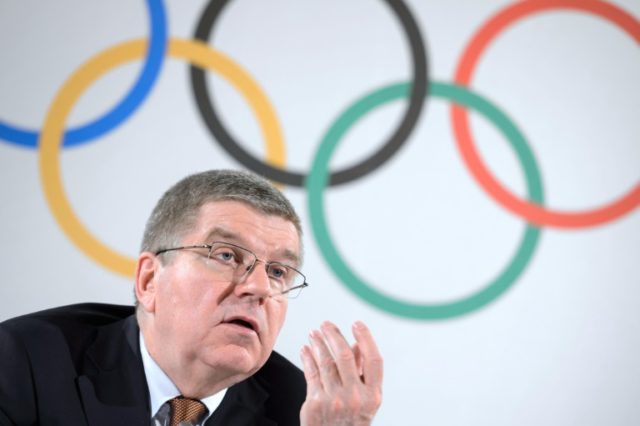Paris (AFP) – IOC president Thomas Bach said Wednesday that athletes and federations face life bans from the Olympics as he warned that doping has hit “an unprecedented level of criminality”.
The International Olympic Committee leader also heightened pressure on Russia to clear up allegations of interference in testing at its doping laboratory during the 2014 Sochi Winter Games.
With 31 athletes from 12 countries already facing a ban from the Rio de Janeiro Olympics in August, Bach warned in a commentary in Le Monde newspaper of tough sanctions, including against individual federations, if the accusations against Russia were proved.
The allegations against the Sochi laboratory are “very detailed and therefore very worrying”, Bach said.
“If the inquiry confirms that the allegations are true, this would be a shocking new scale of doping, with an unprecedented level of criminality,” added Bach.
He said there would be “zero tolerance” against athletes and their entourage.
“This action could go from a life-time Olympic suspension to heavy financial sanctions, even the suspension or exclusion of whole national federations, as is currently the case with the Russian athletics federation.”
Bach also warned that a World Anti-Doping Authority (WADA) inquiry into Russia’s actions in Sochi could “strongly influence” whether its athletes are allowed to return for Rio.
“If the existence of an organised system contaminating other sports was proved, the international federations and the IOC would have a difficult decision to take, between collective responsibility and individual justice.”
Bach even said sporting authorities would have to consider whether the ‘innocent until guilty’ maxim should still be applied.
With international doping scandals mounting, the IOC announced Tuesday that 31 athletes from the 2008 Beijing Olympics had failed tests after their samples were reexamined.
The athletes are from 12 countries.
Some 454 Beijing tests were re-examined and the results from 250 samples retested from the 2012 London Games will be announced shortly.
Bach said: “This decisive action will probably prevent dozens of athletes who have doped from competing in the Rio Olympic Games in 2016.”
The IOC executive board also demanded that WADA start “a fully fledged investigation” into allegations that Russia’s secret services and sports ministry subverted testing at the laboratory for the 2014 Winter Olympics in Sochi.
The IOC has instructed its lab in Lausanne to re-examine samples from Sochi “using the most modern and efficient methods at its disposal.”
The Sochi samples are stored for 10 years in the facility in Lausanne.
Russian authorities have strongly denied any wrongdoing and Bach called for “total cooperation” from them.
Russia is already battling to get its track and field athletes back into the International Association of Athletics Federations (IAAF) so that they can compete in the Rio de Janeiro Games.
The IAAF is to take a decision on June 17 on whether to let the All-Russian Athletics Federation back into the global body so Russian athletes can compete in Rio.
Russia’s Sports Minister Vitaly Mutko said on Sunday that his country was “sorry” and “ashamed” over the doping violations.
But he added that it was “absurd” to believe that Russian athletes were involved in systematic doping at the Sochi Olympics.
Mutko insisted it would be unfair to stop Russian athletes competing in Rio.
Bach, an Olympic gold medal winner in fencing, said in his commentary that the IOC had a powerful duty to protect clean athletes.
He said he had in the past supported calls for life bans for drug cheats. “Because of my experience, I can understand the important emotional expectations of athletes today,” he said.

COMMENTS
Please let us know if you're having issues with commenting.